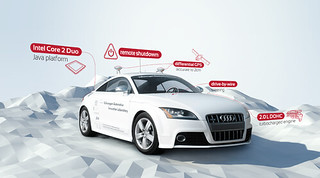 |
| Courtesy of Flickr |
“Open the pod bay door, HAL.”
We Live in a Brave New World
| Internet (Photo credit: Wikipedia) |
The Internet of Everything
| Lenovo IdeaPad U8 MID (Photo credit: Cory M. Grenier) |
The Reason: Money and Access
1. In the first place, both the costs and size of
sensors, controllers, power supplies, memory and wireless transmitters is
falling at a rapid pace. (Combining
these components into an existing appliance or piece of apparel is already
below $30 in many cases using off-the-shelf components.)
2. As Google knows all too well, there’s money to be had
in the sale of online advertising. In
the not-too-distant future you can expect your smart shirt to not only report to
you and your doctor the state of your health, but you better bet that you will
start receiving emails and texts for pharmaceuticals that purport to correct a
condition or enhance performance. (If you think that TV ads can be annoying,
just wait until your prescription medicine bottle and t-shirt starts working
for Madison Avenue.)
Where There’s Money to Be Made There's Opportunity and Danger
Will Your Car Be Smarter Than You Are?
| Automated Audi (Photo credit: byDavvi) |
Clearly the desire for smart
devices is being touted by industry.
It’s also being pushed by the federal government, who is pushing for
what’s known as Vehicle-to-Vehicle (V2V) technology that is going to forever
change the way you operate a motor vehicle.
While today’s cars and trucks are computerized, until now the only thing
that these computers did was make sure that the engine was running
properly. With V2V, what is going to
happen is that your car will become self-aware via sensors that are designed to
detect and react to traffic in real time.
Try to enter an intersection where another vehicle is headed and the car
will hit the brakes. Try to merge into a
lane where a truck is fast approaching and the car will take evasive
action. While this technology is being
touted as a safety device, like every other technological innovation that has
come down the pike, there is a dark side to it.
Just as with other Internet-ready devices, V2V technology is designed to communicate with other
vehicles wirelessly. This opens the door
for hacking. While hacking your smart
refrigerator may result in the milk spoiling, could hacking your V2V equipped
car be an entrée for everything from digital road rage to kidnapping.
Behold, the Smart House
Who knows? What is a certainty is that smart devices are
here to stay. As opposed to waking up
one morning to find yourself surrounded by self-aware appliances, it’s more
likely that like the personal computer the paradigm shift will start slowly and
then ramp up within the next three to five years. Already devices and subscription services are
starting to show up, such as AT&T’s digitallife service that offers to
protect and automate your home for one low monthly price. https://my-digitallife.att.com/learn/
Their YouTube video shows ma
and pa sitting on the porch when the kids pull up. After telling their dad that
they stopped by the house, Dad asks, “Did you leave the house in good
shape?” The 20-something kid
replies, “Of course.” At which point,
dad reaches into his pocket for his smartphone, which he uses to turn on the home’s CCTV camera, turn off a faucet that was left running and lock the front door.
My point is, once home
automation becomes as turnkey as cable subscription services, the race will be
on by businesses large and small to stake a claim. Remember all the
entrepreneurs that entered the dial-up ISP business back in the late '90s. Of course, unlike these early Internet
pioneers, if these Internet pioneers experienced technical difficulties such as
their servers going down or when they got hacked, it was more of an
inconvenience than an emergency. Also, the early days did not have the widespread Smart Criminal tools that are so easily accessible today. If you’re
Smart changes it’s mind (by a hacker) what do you do? If the new wave of home
automation experiences a glitch, would it be possible that your home could aid
and abet a burglar, or heaven forbid, would it be possible that you won’t be
able to gain entry to your own premises? Will you be issuing the command, “Open the front door, HAL"?
Need I Say More?
 |
| Get your FREE eBook Above |
If you like this article, you can find more by typing “technology” in the search box at the top left of this blog.
If you found this article useful, share it with your friends, families, and co-works. If you have a comment related to this article, leave it in the comment sections below. I hope you have found these questions and answers useful.
If you'd like a FREE Copy of our eBook, "Internet Marketing Tips for the 21st Century," please fill in the form in the upper right-hand sidebar, where you will receive instant access to our eBook. Your information is always kept private and is never sold.
Since 1995, Carl Weiss has been helping clients succeed online. He owns and operates several online marketing businesses, including Working the Web to Win and Jacksonville Video Production. He also co-hosts the weekly radio show, "Working the Web to Win," every Tuesday at 4 p.m. Eastern on BlogTalkRadio.com.
If you found this article useful, share it with your friends, families, and co-works. If you have a comment related to this article, leave it in the comment sections below. I hope you have found these questions and answers useful.
If you'd like a FREE Copy of our eBook, "Internet Marketing Tips for the 21st Century," please fill in the form in the upper right-hand sidebar, where you will receive instant access to our eBook. Your information is always kept private and is never sold.
Since 1995, Carl Weiss has been helping clients succeed online. He owns and operates several online marketing businesses, including Working the Web to Win and Jacksonville Video Production. He also co-hosts the weekly radio show, "Working the Web to Win," every Tuesday at 4 p.m. Eastern on BlogTalkRadio.com.




No comments:
Post a Comment